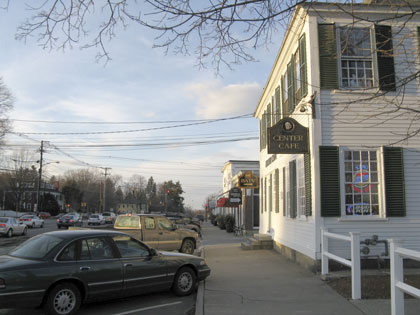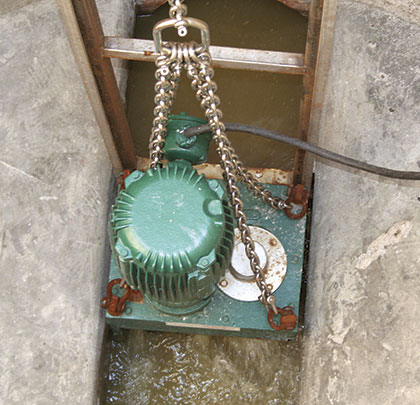Billerica, Massachusetts, embodies an ideal American suburb—picturesque streets, quaint houses, inviting storefronts and a central city square perfect for socializing with fellow neighbors and visitors. Located just 50 minutes north of Boston, Billerica is also a prime spot for young families who want the convenience of a close-by city with the atmosphere of a restful community. As the population has grown over the last few decades—hitting just over 40,000 at the last census—so has the amount of debris flowing through the area’s wastewater treatment system, especially the amount of rags and “flushable” wipes. This extra influent was causing undue stress, equipment damage, and unscheduled maintenance at one of the area’s largest pump stations, and the city looked to a waste reduction solution that would permanently eliminate these problems.
PUMPS PLAGUED BY WIPES
Out of the twenty-two lift stations in the city, the Brown Street Pump Station is one of the largest, with a max flow rate of 5.6 million gallons per day. The facility is comprised of two pumps (duty/standby), with an option for a third pump. Brown Street is near the end of the city’s pump station line, and no significant equipment upgrades have been made since the facility was originally built in the 1970s. Both the location and the age of the station have made the clogging problems associated with wipes especially troublesome.
“Dealing with wipes has been nothing but a nightmare,” says Mike McCaughey, collections supervisor for Billerica. “Brown Street has a 24-inch pipeline leading into the station, and when there’s not enough flow rags just build up inside the pipe. Then, during periods of heavy rain, a slug of storm water rushes through the pipeline and all the rags hit the pumps at once.” This influx of wipes and rags would also cause issues during routine cleanings of the wet well. Once the maintenance crew broke up the matted grease and wipes at the top of the chamber, this debris would rush through the pumps at the same time.
During peak storm events, McCaughey and his crew were clearing wipes out of the pumps at Brown Street as often as three times per day. This necessitated a total system shutdown so the pumps could be taken off line, disassembled and cleared of the blockages, and then restarted. Not only was this process time and labor intensive, continual restarting causes significant strain and stress on the pump itself—particularly for seals and bearings, which are prone to failures after frequent start-ups.
McCaughey looked for a solution that would protect the pumps at Brown Street, and the remaining pump stations downstream, without inhibiting flow or requiring a major system redesign.

SIMPLE SOLUTION RESTORES EFFICIENCY
McCaughey’s top priorities for choosing a solution to combat wipes at Brown Street were ease of installation into the existing system, cost, and long-term reliability. He had previously worked with Aqua Solutions, Inc., a local provider of wastewater and water treatment products and design solutions, to install sewage grinders in the area’s newer pump stations. The city had been pleased with the grinders at those facilities, and noted that clogging and blockage issues were virtually eliminated after the installation. Jim Deluca, president of Aqua Solutions and the manager of the Brown Street upgrade, recommended the new Channel Monster® model Wipes Ready grinder from JWC Environmental.
The grinder is comprised of rotating screening drums with ½-inch perforated openings, which feed debris into a dual-shafted grinder. This solution fully shreds solids while maintaining proper flow capacities at pump stations.
“The grinder made a huge difference,” says McCaughy. “We’ve gone two months without ever pulling the pumps and they’re running much more effectively.” McCaughey found the system to be a durable, economical and versatile solution to protect the Brown Street pumps and pipelines.
Since the installation of the Channel Monster model Wipes Ready in 2014, the need for daily pump maintenance has been eliminated. Maintenance crews no longer have to take time away from planned projects in order to service the pumps at Brown Street and manually remove the clogs and ragballs from the equipment.
THE FUTURE OF FLUSHABLES
According to a study conducted by the Association of the Nonwoven Fabrics Industry, consumer wipes usage is expected to grow considerably through 2017, at about 16 percent year-over-year. While public outreach and awareness campaigns continue to take hold—for example, the recent What2Flush initiative—this effort alone isn’t enough to permanently change consumer behavior. The most productive solution for pump station owners is to assume that the wipes problem at their facility isn’t going away anytime soon. By incorporating a pump protection system directly within a pump station, like a dual-shafted grinder, facilities managers can rely on a cost-effective and reliable solution to permanently eliminating the clogging issues and downtime associated with rags, fabrics, and wipes. ◆
For More Information:
Kevin Bates is director of marketing of JWC Environmental. Since its founding in 1973, JWC Environmental has become a world leader in solids reduction and removal for the wastewater industry with its Muffin Monster grinders and Monster screening, compaction, and washing systems. JWC also solves challenging size reduction and processing problems in commercial and industrial applications through its Monster Industrial division. JWC Environmental is headquartered in Costa Mesa, California, and has a global network of representatives, distributors, and regional service centers to provide customer support. For more information, visit www.jwce.com.
____________________________________________
MODERN PUMPING TODAY, March 2016
Did you enjoy this article?
Subscribe to the FREE Digital Edition of Modern Pumping Today Magazine!
![]()


